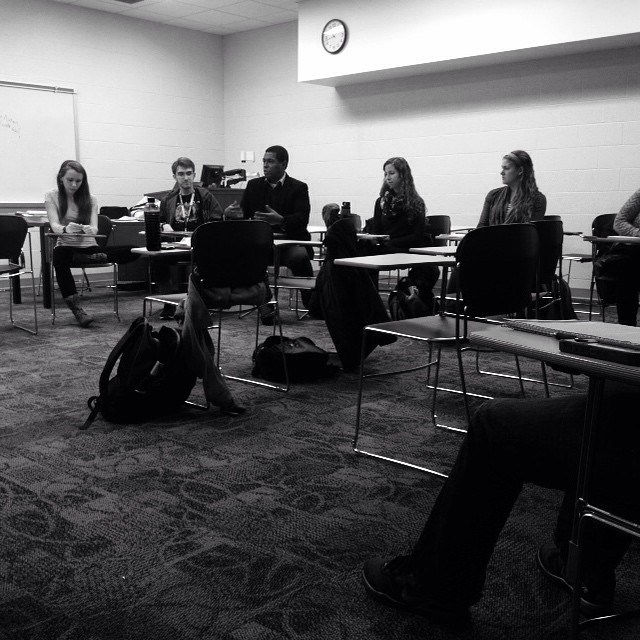
Student Hannah Matthews, on Instagram, shared a photo of a discussion in one of Dr. Richard Newton’s three teach-in classes.
The first day of a new semester is typically dedicated to the syllabus. This was not the case in many Elizabethtown College classrooms as the spring 2015 term opened.
Several Elizabethtown College faculty members, who saw the relevance of recent issues in Ferguson, Mo., and Staten Island, N.Y., for their courses, decided to devote time during the first class meeting of the spring semester to conversations where students could share, discuss and debate their reactions. As a part of this two-day “teach-in” event, held Jan. 12 and 13, more than 20 faculty members, from a variety of disciplines, led talks applicable to the subject matter of their particular courses. In addition to students enrolled in the class, many faculty members opened their doors to interested campus community members and the general public.
Among the dozens of choices: “Closing Our Eyes and Listening: Teaching Tolerance” in an upper-level education class; “Minorities and the State in Contemporary China: Lessons from Ferguson” in Modern Asia, a history course; “Race, Gender and I.Q.” in Intelligence and Creativity, an upper-level psychology class; and “Unpacking the Knapsack: Understanding White Privilege Even if You Think You Don’t Have Any,” in a social justice course. View the full list, here.
Excited to get to see other professors outside of my major share their professional perspectives!”
A statement from the Dean of Faculty’s office, shared with members of the campus community, said, “We hope that the varied perspectives and outcomes of these classroom discussions will prompt our students and faculty to greater critical thinking, cultural understanding and engaged citizenship.”
In reviewing uses of the official event hashtag, #etownengage, it is evident that faculty members and students were affected by the teach-in, and students visited classrooms and heard from professors they’d not likely hear from otherwise.
In a tweet, student Emily Hornung said, “Excited to get to see other professors outside of my major share their professional perspectives!” Dr. Dan Chen, who talked about structural, institutional and cultural aspects of political participation, tweeted, “Had great discussions on race, cultural misperceptions and police militarization with my Comparative Politics students.” And Dr. David Kenley, who led the contemporary China class, tweeted, “Great teach-in today. My class had everything from a 17- to a 40-year old. Hope the discussion continues.”
To see more social media activity, visit this Storify.

